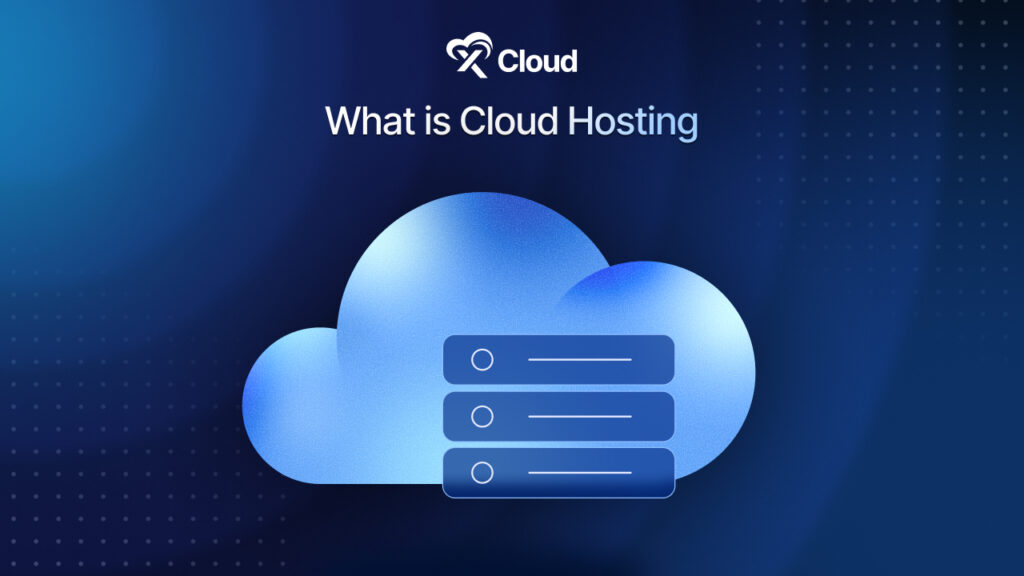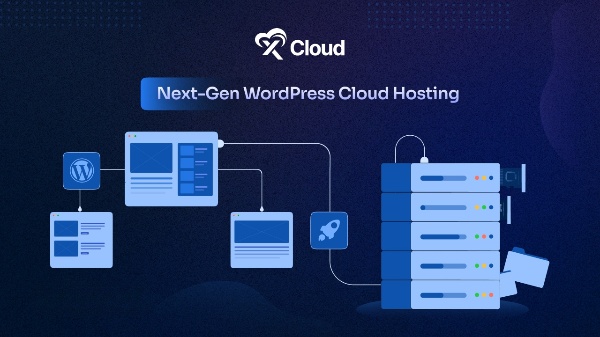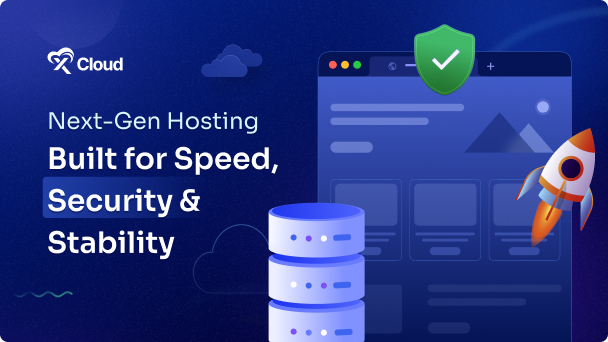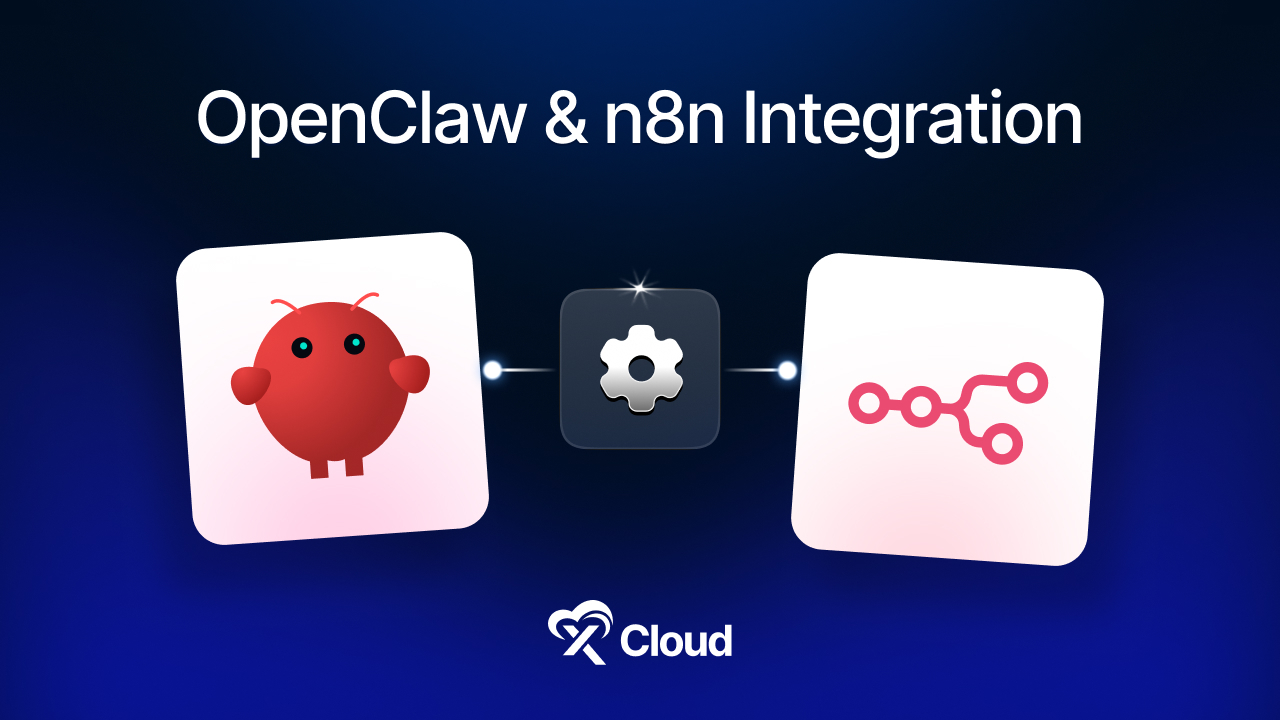Cloud hosting has become a popular solution for websites and applications that demand flexibility, speed, and security. Whether you run a small blog, an online store, or a growing tech startup, you may have heard about cloud hosting. But what is cloud hosting? How does it work? And most importantly, is it right for you?

In this guide, you will learn everything you need to know about cloud hosting so that you can make informed decisions about choosing a cloud hosting provider. Let us get started.
🔻What Is Cloud Hosting?
Cloud hosting is a type of web hosting that uses multiple servers to store and deliver your website or application data. Unlike traditional hosting, which relies on a single server, cloud hosting spreads your content across a network of virtual servers. These servers work together to keep your site online, fast, and secure.
In traditional hosting, your website is on one machine. If that server fails, your site goes offline. With cloud hosting, the chance of downtime is much lower. If one server fails, another takes over. This process is called redundancy, and it is one of the biggest benefits of cloud hosting.
The cloud migration market is expected to grow significantly, reaching USD 232.51 billion in 2024 and USD 806.41 billion by 2029, with a compound annual growth rate (CAGR) of 28.24%. This growth shows that businesses are recognizing the clear benefits of cloud technology.
Cloud hosting pulls resources like CPU, memory, and storage from a shared pool of servers. These resources are distributed as needed, making cloud hosting very flexible and scalable.
Cloud hosting is also perfect for websites that expect to grow. You can start small and increase your resources as your traffic increases, all without changing your hosting plan. In simple terms, cloud hosting is reliable, scalable, and keeps your website running smoothly, no matter what happens.
Here is how cloud hosting transforms the hosting landscape:
Resource Distribution
Your website can use the combined power of multiple servers instead of being limited to just one. This gives you more processing power, storage space, and bandwidth when you need it.
Virtualization Technology
Cloud hosting uses hypervisor software to create virtual servers from physical hardware. These virtual servers can be quickly deployed, scaled, or moved without affecting your website’s performance.
Network-Based Infrastructure
Your website’s files and data are stored across multiple servers in different locations, creating a robust network that can handle traffic spikes and hardware failures seamlessly.
On-Demand Scaling
Unlike traditional hosting where you are locked into specific resource limits, cloud hosting allows you to scale your resources up or down based on real-time demand, ensuring optimal performance without overspending.
This new way of web hosting removes many problems found in traditional hosting. You receive more PHP workers, allowing your site to handle hundreds of user requests at the same time. This means your site runs smoothly, no matter how much traffic you get. The cloud provider takes care of all the technical maintenance, security updates, and infrastructure management. This lets you focus on growing your business.
🔻Common Use Cases for Cloud Hosting
Cloud hosting is flexible and works well for many types of websites, apps, and online services. Whether you have a personal project or a large business, cloud hosting can help you achieve your goals. Here are some real-world ways cloud hosting can be useful:
- Personal blogs, portfolio sites, business sites
- eCommerce stores
- SaaS and web applications
- Media streaming and content delivery
- Startups and tech businesses
- Online education platforms
- Healthcare providers
- Development and testing environments
- Big data and analytics
- Internet of Things (IoT)
🔻How Does Cloud Hosting Work?
To understand how cloud hosting works, you need to know about virtualisation. Virtualisation is the technology that makes cloud hosting possible. It takes one powerful physical server and splits it into many virtual servers. Each of these virtual servers can run websites, apps, or services independently. Let us break it down into three key components:
Virtual Servers
When you use cloud hosting, your website is hosted on a virtual machine. This machine acts like a real server, but it is created using software. It runs its own operating system and applications. Even though other virtual servers exist on the same physical machine, your server is isolated. This means other users cannot affect your performance or data.
Physical Hosts
The virtual servers run on physical hosts. These are real, high-performance computers with powerful processors, memory, storage, and networking. The physical host’s job is to provide the hardware that supports your virtual server. If one physical host goes down, the system moves your site to another one automatically. This makes cloud hosting very reliable.
Hypervisors
A hypervisor is the software that creates and manages the virtual servers on each physical host. It decides how much CPU power, memory, and storage each virtual machine gets. It also moves workloads between hosts when needed. The hypervisor keeps everything balanced so that your site stays online and runs efficiently.
Load Balancing & Resource Distribution
Cloud hosting employs intelligent monitoring systems that continuously distribute processing loads across multiple servers in the cluster. This load balancing ensures that no single server becomes overwhelmed while others remain underutilised. When traffic spikes occur, the system automatically distributes the additional load across available servers, maintaining optimal performance.
The clustered approach removes the need to rely on just one server. This setup provides backup and keeps things running smoothly, even if some servers have problems. This distributed design gives cloud hosting its strong reliability and performance benefits.
Other Important Features
Most cloud hosting platforms also include a dashboard or control panel. These panels allow you to manage your website, monitor performance, upgrade your resources, and set up backups. Even if you are not a developer, you can use these tools easily.
🔻Types of Cloud Hosting
Cloud hosting is not a one-size-fits-all solution. There are different types of cloud hosting models. Each one serves specific needs based on control, cost, and performance. Understanding these types will help you choose the right fit for your website or business.
1. Public Cloud
A public cloud is the most common type. It uses a shared infrastructure where multiple users access the same pool of servers and resources. Think of providers like Amazon Web Services (AWS), Google Cloud Platform, or Microsoft Azure.
Public cloud hosting is cost-effective and easy to scale. You only pay for what you use. It is perfect for startups, small businesses, or anyone looking for flexibility without a big upfront investment.
ℹ️Best for: Blogs, small businesses, startups, and development environments.
2. Private Cloud
A private cloud is exclusive. It offers dedicated resources that only your organization can access. This setup provides greater control, better customization, and stronger security.
It can be hosted on your premises or through a third-party provider. Businesses with strict compliance needs, like those in healthcare or finance, often choose private clouds.
ℹ️Best for: Enterprises, regulated industries, and internal applications.
3. Hybrid Cloud
A hybrid cloud combines public and private cloud environments. Some parts of your infrastructure run in the public cloud, while others remain private.
This model gives you the best of both worlds. You get cost savings from the public cloud and security from the private cloud. Hybrid clouds are great for businesses that want flexibility while keeping sensitive data protected.
ℹ️Best for: Businesses with mixed hosting needs or staged cloud migration strategies.
4. Managed Cloud Hosting
Managed cloud hosting is ideal if you do not want to handle the technical side. In this model, the cloud provider takes care of server setup, updates, security, and performance optimization.
You focus on running your website or app, and the provider ensures everything works smoothly behind the scenes. Here, xCloud’s fully Managed Hosting make this process even easier.
ℹ️Best for: Entrepreneurs, non-tech users, and busy teams who want simplicity and peace of mind.
🔻Benefits of Cloud Hosting
Cloud hosting offers more than just space for your website. It gives you real advantages that can help your business grow. These benefits go beyond basic hosting features. They impact how your site performs, how much you spend, and how secure your data stays.
Let us explore the key benefits.

Faster Website Performance
Cloud hosting uses multiple servers to balance website traffic. This reduces delays, improves load speed, and ensures smooth browsing even during peak times. Many providers also include CDN integration, which delivers content from servers close to the user.
Stronger Security
Security is a top priority in cloud hosting. Providers use firewalls, encryption, and access control to protect your data. They also run regular security audits and offer automated backups. A dedicated IP address adds another layer of protection by keeping your site isolated from harmful activity on shared servers.
Better Email Deliverability
With a dedicated IP, your emails are less likely to end up in spam folders. Shared hosting often puts your site on the same IP as others, which can harm your reputation. Cloud hosting fixes that by giving you full control over your IP’s credibility.
High Uptime and Reliability
Cloud hosting uses server clusters. If one server fails, another takes over instantly. This setup gives you strong uptime, often 99.9% or higher. Your site remains online and available to users without interruption.
WooCommerce and CMS Optimization
Many cloud platforms are optimized for CMS tools like WordPress and eCommerce systems like WooCommerce. They offer one-click installs, faster PHP application execution, and better database performance. This is perfect for online stores that need both speed and reliability.
Scalable Resources
You can start with a small plan and grow as your traffic increases. Upgrading your CPU, memory, or storage takes only a few clicks. There is no need to move to a new server or provider. Cloud hosting adjusts to your needs in real time.
Automatic Backups and Disaster Recovery
Most cloud hosting services offer daily or weekly backups. In case of a crash or hack, you can restore your site with one click. This peace of mind is especially valuable for businesses that handle customer data.
Easy to Use
Even if you are not a developer, you can manage cloud hosting easily. With dashboards like hPanel or CloudPanel, you can control your website, email accounts, backups, and more without writing any code.
These benefits make cloud hosting a powerful and flexible solution. Whether you run a personal blog or a busy online store, you can enjoy better performance, stronger security, and lower costs with cloud hosting.
🔻Cloud Hosting vs Other Hosting Types
Understanding how cloud hosting compares to other hosting options is crucial for making an informed decision. Each hosting type has its place in the market, but cloud hosting offers unique advantages that make it increasingly popular among businesses of all sizes.
🟢Cloud Hosting vs Shared Hosting
Shared hosting represents the most basic and affordable hosting option, where multiple websites share the resources of a single server. While this creates cost savings, it also introduces limitations that cloud hosting elegantly addresses.
Resource Allocation Differences
In shared hosting environments, one physical server stores data from multiple websites, and all users share the same bandwidth, storage capacity, and processing power. If one website experiences a traffic spike, it can slow down or crash other sites on the same server. Cloud hosting, in contrast, distributes resources across multiple servers, ensuring that your site can access additional power when needed.
Performance and Reliability
Shared hosting users often experience slower load times and potential downtime due to resource limitations and shared IP addresses. Cloud hosting provides dedicated IP addresses and can handle hundreds of user requests simultaneously through multiple PHP workers. Our cloud hosting plans offer 20x more resources than traditional shared hosting, giving you significantly more room for growth.
Cost Comparison
- Shared Hosting: $1-15/month, making it the most affordable option
- Cloud Hosting: $5-200/month, depending on resources and features
- Value Proposition: While cloud hosting costs more upfront, it provides better performance, reliability, and scalability
Security Considerations: Shared hosting environments are more susceptible to security issues because multiple sites share the same IP address. If one site engages in spam or becomes compromised, it can affect all sites sharing that server. Cloud hosting provides dedicated IP addresses and advanced security measures, including DDoS protection and regular security updates.
When to Choose What:
- Shared Hosting: This option is great for personal websites, blogs, and small businesses that have limited traffic and tight budgets.
- Cloud Hosting: Ideal for growing businesses, e-commerce stores, and websites that need reliability and scalability
🟢Cloud Hosting vs VPS Hosting
Virtual Private Server (VPS) hosting uses virtualization technology to create isolated virtual environments on a single physical server. While this provides more control and resources than shared hosting, it differs significantly from cloud hosting’s distributed approach.
Infrastructure Approach
VPS hosting partitions a single physical server into multiple virtual servers, each with dedicated CPU, RAM, and storage allocations. Cloud hosting uses multiple interconnected servers working together, providing a much larger pool of resources and better redundancy.
Scalability and Flexibility
VPS hosting offers limited scalability because you are constrained by the physical server’s total resources. If you need more power, you typically have to upgrade to a larger plan or migrate to a different server. Cloud hosting provides dynamic scaling where additional resources can be drawn from the server pool as needed, offering greater flexibility for handling traffic spikes.
Management and Control
VPS hosting often requires more technical knowledge because users have root access and must manage their server configurations. Many VPS plans are self-managed, making them more suitable for tech-savvy individuals. Cloud hosting, especially managed cloud hosting, handles technical maintenance automatically while providing user-friendly control panels.
Performance Comparison
- VPS Hosting: Stable performance with dedicated resources, but limited by single server constraints
- Cloud Hosting: Superior performance through load balancing and distributed resources
- Reliability: Cloud hosting wins with built-in redundancy and automatic failover capabilities
Cost Structure: VPS hosting typically uses fixed monthly pricing, while cloud hosting often employs pay-as-you-go models. This makes cloud hosting more cost-effective for businesses with variable traffic patterns.
🟢Cloud Hosting vs Dedicated Hosting
Dedicated hosting provides complete control over an entire physical server, offering the highest level of performance and customization. However, it comes with significant costs and management requirements that cloud hosting addresses more efficiently.
Resource Control
Dedicated hosting gives you unlimited access to all server resources, including CPU, RAM, storage, and bandwidth. Cloud hosting provides virtually unlimited scalability through its distributed architecture, often delivering similar or better performance at a fraction of the cost.
Cost Analysis:
- Dedicated Hosting: $80-500+ per month, plus additional costs for management and maintenance
- Cloud Hosting: $10-200+ per month with flexible scaling options
- Total Cost of Ownership: Cloud hosting typically offers better value due to reduced management overhead
Performance and Reliability
While dedicated servers provide consistent performance, they create single points of failure. If your dedicated server experiences hardware issues, your entire website goes offline. Cloud hosting’s distributed architecture ensures that server failures do not impact your website’s availability.
Management Requirements
Dedicated hosting requires advanced technical skills for server management, security updates, and troubleshooting. Cloud hosting providers handle these tasks automatically, allowing you to focus on your business rather than infrastructure management.
Customization vs Convenience
Dedicated hosting offers unlimited customization possibilities, but cloud hosting provides the right balance of flexibility and convenience for most businesses. Modern cloud platforms offer extensive configuration options without the complexity of managing physical hardware.
Best Use Cases:
- Dedicated Hosting: Large enterprises with specific compliance requirements, custom applications needing particular configurations, or businesses with predictable, high-volume traffic
- Cloud Hosting: Most businesses seeking reliability, scalability, and cost-effectiveness without management complexity
Most cases show a clear trend toward cloud hosting. It offers dedicated resources with a distributed setup, making it affordable and easy to manage. As technology improves, cloud hosting now delivers performance and customization that used to need dedicated servers, but it does so more flexibly and cost-effectively.
Here is a quick glance between the differences on Cloud Hosting vs Traditional Hosting:
| Feature | Cloud Hosting | Shared Hosting | VPS Hosting | Dedicated Hosting |
| Infrastructure | Distributed across multiple virtual servers | Single physical server shared with other websites | Single physical server split into isolated virtual environments | One entire physical server exclusively for your website |
| Scalability | High – On-demand scaling without downtime | Very limited – must upgrade to a higher plan | Moderate – limited by the host server’s capacity | Low – requires hardware upgrades or migration |
| Performance | Excellent – Load balanced across servers | Low – Affected by other sites on the server | Good – Dedicated resources but limited to one server | Excellent – Full access to all server resources |
| Reliability/Uptime | High – Automatic failover and redundancy | Low – If the server crashes, all sites go down | Moderate – Downtime if the physical server fails | High – Reliable but still has a single point of failure |
| Security | Strong – Isolation, encryption, firewalls, backups | Basic – Higher risk due to shared environment | Good – Isolated environments, but still on shared hardware | Very strong – Complete control over security configurations |
| Ease of Use | High – Managed services and dashboards available | Very easy – Ideal for beginners | Moderate – Requires some technical knowledge | Low – Requires advanced system administration skills |
| Customization | Moderate – Depends on the provider | Very limited – Preconfigured settings | Good – Root access and flexible configurations | Full – Maximum customization possibilities |
| Cost | $5–$200/month (flexible pricing, pay-as-you-go options) | $1–$15/month (cheapest option) | $20–$100+/month (based on specs) | $80–$500+/month (plus maintenance and management costs) |
| Best For | Growing websites, eCommerce, SaaS, high-traffic apps | Personal blogs, hobby sites, low-traffic business sites | Developers, medium-sized businesses, apps with predictable load | Large enterprises, mission-critical apps, regulated industries |
| Management | Fully or partially managed depending on provider | Fully managed | Often self-managed (some managed plans available) | Typically self-managed (managed options available at extra cost) |
🔻 Recommended Cloud Hosting with All Essentials Features
If you are looking for a reliable, scalable, and user-friendly cloud hosting provider, xCloud Hosting deserves your attention. xCloud offers a powerful set of features tailored for users of all levels—from small business owners to professional developers.
xCloud Hosting gives you access to fast, secure, and scalable virtual servers powered by modern cloud infrastructure. You do not need to deal with the technical setup. xCloud takes care of performance, security, and updates while you focus on your website or application.
Why Choose xCloud Hosting?
- High Uptime Guarantee: 99.9% uptime to keep your site available around the clock
- Fully Managed Hosting Services: Server monitoring, security patches, and updates are handled automatically.
- 30+ Server locations: xCloud Hosting provides over 30 server locations for its managed cloud hosting services.
- Global CDN: Faster content delivery worldwide with the integration with Cloudflare
- 1 Click Scalable Resources: Instantly upgrade CPU, RAM, or storage
- Secure Backups: Automatic backups with one-click restore
- SSD Storage: Fast NVMe SSDs for better speed
- Beginner-Friendly: No technical skills needed
- Flexible Pricing: Starts with only $5/month. Get plans for your every need.
- Fast Support: 24/7 expert help
- Trusted by Professionals: Reliable for businesses, agencies, developers, and individuals.
- One-Click Installations: Effortlessly deploy WordPress, Laravel, PHP, and other one-click applications, all managed from a single, intuitive control panel.
- Business websites
Whether you are a developer building portfolios, a business needing sustainable hosting, an agency requiring reliable hosting for clients, or an individual wanting to create their dream website – xCloud Hosting offers the power, simplicity, and control you need, all in one place.
🔻Future Trends in Cloud Hosting
Cloud hosting evolves fast. You need to stay ahead to keep your website or app competitive. New technologies and strategies are shaping the future. Let us explore the trends that will define cloud hosting in 2025 and beyond. These advancements promise better performance, sustainability, and innovation for your projects.
Multi-Cloud Strategies
Multi-cloud strategies gain traction. You no longer rely on one provider. Businesses use multiple cloud platforms to boost flexibility. This approach avoids vendor lock-in. You pick the best services from providers like AWS, Azure, or Google Cloud. A 2023 survey found that 87% of enterprises use multi-cloud setups. This trend grows as you seek cost savings and resilience. Mixing providers ensures your site stays online during outages.
Edge Computing
Edge computing transforms data processing. You process data closer to its source, like IoT devices or users. This cuts latency and speeds up performance. Imagine a smart city where traffic data updates instantly. Edge computing supports real-time applications. It works with cloud hosting to handle massive data from IoT, expected to reach 29 billion devices by 2030. You get faster, more efficient services.
Artificial Intelligence (AI) And Machine Learning (ML)
Artificial intelligence reshapes cloud hosting. AI optimizes resource allocation and security. You benefit from automated scaling and threat detection. Cloud providers offer AI-as-a-service, so you do not need in-house expertise. AI powers chatbots, analytics, and personalized experiences. For example, training large language models demands cloud power. You tap into AI without building costly infrastructure.
Quantum Computing Integration
Quantum computing emerges on the horizon. It uses quantum mechanics for ultra-fast calculations. You will solve complex problems in seconds, not years. Cloud platforms integrate quantum computing for tasks like cryptography or drug discovery. Google and IBM have already experimented with quantum cloud services. You gain access to cutting-edge tools without owning a quantum computer.
Green Cloud Hosting
Eco-friendly infrastructure grows in demand. You care about sustainability, and so do cloud providers. Data centers consume 1.8% to 3.9% of global emissions. Providers now use renewable energy and efficient cooling. You reduce your carbon footprint with green hosting. Companies like xCloud prioritize sustainable practices. This trend aligns with your values and regulatory needs.
🔻How You Can Choose the Right Cloud Hosting Plan
Choosing a cloud hosting plan does not have to be confusing. You just need to match your needs with the right features and pricing. Whether you are launching a small blog or scaling an enterprise application, the right plan gives you the balance of cost, performance, and control. Here is how to choose the best cloud hosting plan for you.
Know Your Website’s Needs
Choosing a cloud hosting plan begins with understanding your website’s requirements, such as anticipated traffic, content type, and any e-commerce functionalities, to determine the ideal CPU, memory, storage, and bandwidth.
Check the Pricing Plans
Evaluate pricing models like pay-as-you-go or fixed monthly plans, looking for transparency, free trials, and potential long-term discounts to ensure alignment with your budget.
Match Features with Your Goals
Ensure the plan includes essential features like a dedicated IP, CDN integration, daily backups, one-click app installs, email hosting, and SSL certificates, prioritizing necessities over unnecessary extras.
Look at Support And Uptime
Prioritize providers offering 24/7 technical support via live chat or phone, comprehensive documentation, and a strong SLA guaranteeing at least 99.9% uptime, especially if you’re not technically adept.
Test the Platform Before Committing
Before committing, utilize free demos, trial periods, and customer reviews to assess the platform’s user-friendliness, load speed, support responsiveness, and overall reliability.
Consider Growth
Select a plan that allows for easy upgrades without downtime and the addition of new features, ensuring it can accommodate future growth and increased traffic without requiring a migration.
🔻Frequently Asked Questions
What is the difference between cloud hosting and traditional hosting?
Traditional hosting uses one physical server, while cloud hosting uses a network of virtual servers. Cloud hosting offers better uptime, speed, and flexibility.
Is cloud hosting good for beginners?
Yes. With managed cloud services and easy control panels, even non-technical users can get started quickly.
How secure is cloud hosting?
Very secure. Most providers offer firewalls, encryption, regular backups, and compliance with data protection standards.
Can I host a WordPress site on cloud hosting?
Absolutely. Many cloud platforms support one-click WordPress installs and performance optimization tools.
Does xCloud hosting support eCommerce?
Yes. Cloud hosting offers WooCommerce hosting with scalable resources and faster load times, which are perfect for any online store.
How do I scale my cloud hosting plan?
Most platforms allow you to increase or decrease resources instantly through their dashboard. With xCloud, you can scale your resources with just one click.
What happens if a server fails?
Cloud hosting uses redundancy. If one server fails, your site is automatically moved to another server in the network.
Do I need technical knowledge to manage cloud hosting?
Not necessarily. Managed cloud hosting providers take care of setup, maintenance, and security so you can focus on your site.
What is the cost of cloud hosting?
Costs vary based on usage and features. Most platforms offer pay-as-you-go or monthly plans to fit different budgets.
Why choose xCloud Hosting?
xCloud Hosting offers fast, secure, and scalable hosting with excellent support. It is easy to use, beginner-friendly, and packed with features for growth. Also, the flexible pricing plans start at only $5 per month.
🟥Power Your Future: Build, Scale, and Thrive with Fully Managed Cloud Hosting by xCloud
Cloud hosting is an essential solution for individuals, startups, and businesses that need flexibility, speed, and reliability. Whether you are starting a blog or managing an online store, cloud hosting helps you grow without limits.
Before choosing a cloud hosting provider, assess your website’s needs. Evaluate pricing, support, uptime, and features. Conducting this research now can save you time and stress later. Coud hosting is designed to be easy to use. It lets you focus on your website or business while the platform takes care of everything else. If you are ready to level up your hosting, cloud hosting is a smart step forward.
If you have found this blog helpful, feel free to subscribe to our blogs for valuable tutorials, guides, knowledge, and tips on web hosting and server management. You can also join our Facebook community to share insights and engage in discussions.






































